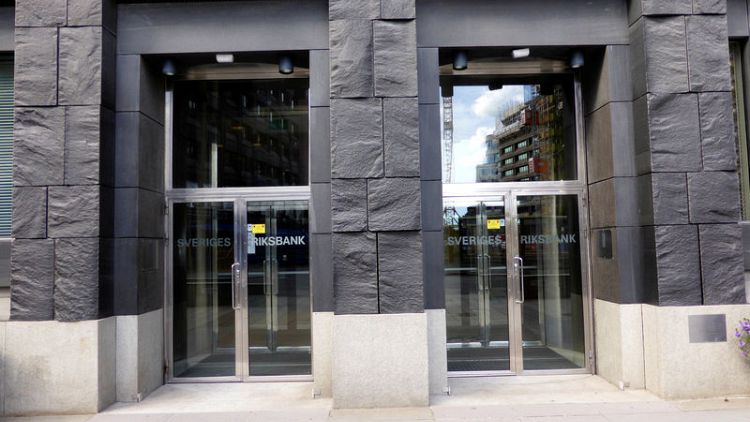By Simon Johnson
STOCKHOLM (Reuters) - Sweden's central bank held its benchmark repo rate unchanged at -0.25% as expected on Thursday but surprised many by saying it would bring an end to a more-than five-year experiment with negative rates in December even though the economy is slowing.
While central banks globally look to ease policy as a trade war between the United States and China, the prospect of a no-deal Brexit and a slowdown in Europe all hit growth, the Riksbank is set to buck the trend.
While interest rate-setters acknowledged that the economy was slowing more sharply than expected, they said there was no sign of a recession and stressed that policy would remain very expansionary even after a rate hike.
Furthermore, inflation has been in line with Riksbank's forecasts, even if at 1.3% in September it is far from the central bank's 2% target.
"As before, the forecast indicates that the interest rate will most probably be raised in December to zero percent," the central bank said in a statement.
It said a domestic and global slowdown meant the rate path after December had been revised downward "and indicates that the interest rate will be unchanged for a prolonged period".
In September, the Riksbank said it would hike late this year or early next.
The crown, which had strengthened before the decision, continued to gain, hitting its strongest level against the euro for around a month. <EURSEK=>
"This comparatively hawkish stance is at odds with the weakness of the domestic economy and a global backdrop where major central banks are cutting rates," Capital Economics economist David Oxley said in a note.
"On balance, though, it appears that the Bank's desire to get rates out of negative territory appears to have outweighed any expected boost from a further rate cut."
All analysts in a Reuters poll had forecast no change in borrowing costs. The median forecast in the poll was for the benchmark rate to remain unchanged through next year and into 2021.
INCOMPREHENSIBLE
The Riksbank was one of the first central banks to push rates below zero in a previously untried experiment to get the economy moving again after the financial crisis of 2008-9.
But it has proved tricky to negotiate an exit, with the Riksbank only managing a single rate hike since mid-2011 despite an economy expanding at close to maximum speed.
Concern among central bankers and economists has been growing about the effects of negative rates on savers, banks and pension funds along with worries that should another downturn bite, there is little left in armouries to stimulate demand.
Many analysts believe the Riksbank should have normalised policy much sooner, following the Federal Reserve, the Bank of England and neighbour Norway in hiking rates.
"In my view it is incomprehensible," Danske Bank analyst Michael Grahn said, referring to the timing of the decision to start tightening policy.
"The entire economic picture is weaker than the Riksbank has been expecting. On top of that the inflation pace is quite a bit below target, inflation expectations are coming down, and other central banks are moving in the opposite direction."
Norway's central bank kept its key rate on hold at 1.5% on Thursday after four rate hikes in a year, the most recent in September. It sees rates on hold for the foreseeable future.
The European Central Bank meets later in the day, but is not expected to add further stimulus after last month's package, which included a rate cut, while the U.S. Federal Reserve could cut rates again when it meets at the end of this month.
GRAPHIC: Sweden economy: http://tmsnrt.rs/2bylYpf
GRAPHIC: Riksbank rate, inflation and the Krona: http://tmsnrt.rs/1qEN4Rz
(Reporting by Simon Johnson, Anna Ringstrom, Helena Soderpalm; Editing by Niklas Pollard and Catherine Evans)



